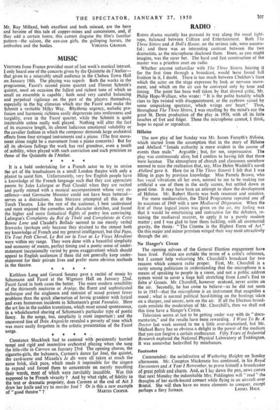RADIO
RADIO drama recently has pursued its way along the usual tight- rope, balanced between Culture and Entertainment. Both The Three Sisters and A Doll's House, on the serious side, were success- ful; and there was an interesting contrast between the two dramatists, as the microphone disclosed them. Ibsen, as you might imagine, was the surer bet. The hard and fast construction of the master was a priceless asset on radio.
Whether anyone unfamiliar with The Three Sisters, hearing it for the first time through a broadcast, would have found full fruition in it, I doubt. There is too much between Chekhov's lines which the actor on the stage expresses by look or nervous move- ment, and which on the air can be conveyed only by tone and timing. The point has been well taken by that shrewd critic, Mr. Philip Hope-Wallace, who wrote: "It is the polite banality which rises to lips twisted with disappointment, or the eyebrow raised by some unspeaking spectator, which wrings our heart." Thus, throughout The Three Sisters, I was recalling by the mind's eye the great St. Denis production of the play in 1938, with all its little touches of fret and fidget. These the microphone cannot, I think, hope to equal or reproduce.










































 Previous page
Previous page